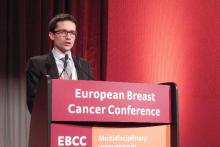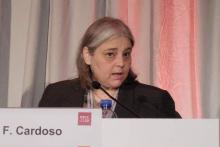AMSTERDAM – Premenopausal women with breast cancer at high risk for recurrence had a significantly improved 10-year rate of overall survival when they received a dose-dense chemotherapy regimen, compared with women treated with a standard dosage schedule.
This post hoc analysis of 1,549 premenopausal patients, a subgroup drawn from two separate trials run a decade apart, helps further confirm the benefit of the dose-dense approach in this population. “I think that European practice will now change,” based on this new analysis plus other recent findings from smaller studies, predicted Dr. Matteo Lambertini, who reported the analysis at the European Breast Cancer Congress.
“Dose-dense adjuvant chemotherapy may be considered the preferred treatment option and should be proposed to all high-risk, premenopausal breast cancer patients who are candidates for chemotherapy,” said Dr. Lambertini of Azienda University Hospital in Genoa, Italy. Although dose-dense regimens are common in U.S. practice for these patients and used at certain European Centers, many other European cancer programs still use standard-dose chemotherapy, he said.
The findings also showed that when treatment induced amenorrhea, it had no bearing on subsequent survival, and that the dose-dense regimen did not cause amenorrhea.
The analysis run by Dr. Lambertini and his associates pieced together data from premenopausal women who formed subgroups in two large Italian trials of dose-dense regimens as adjuvant chemotherapy for women of all ages with early-stage breast cancer: the Mammella InterGruppo (MIG) 1 trial and the Gruppo Italiano Mammella (GIM) 2 trial. MIG1 randomized 1,214 patients with early-stage breast cancer to standard chemotherapy given in 3-week cycles or in dose-dense 2-week cycles. At a median 10-year follow-up, the results showed a nonsignificant difference in overall survival between the two arms; the findings primarily demonstrated the safety of the dose-dense regimen (J Nat Cancer Inst. 2005 Dec 7;97 [23]:1724-33). GIM2 randomized 2,019 patients with early-stage breast cancer to the same alternatives, standard chemotherapy administered either every 2 or every 3 weeks and followed them for a median of 7 years. Its results showed a statistically significant improvement in disease-free survival after 5 years with the dose-dense regimen (Lancet. 2015 May 9;385[9980]:1863-72).
All patients in both studies routinely received ongoing treatment with a granulocyte colony–stimulating factor analogue during chemotherapy to help avoid the development of anemia or leukopenia.
Dr. Lambertini’s analysis focused on the 1,549 women from both studies who were premenopausal at the time they received treatment, with more than half of these patients younger than 45 years old. In this population, treatment with the dose-dense regimen resulted in a statistically significant increased rate of 10-year overall survival, expressed as a 29% reduced hazard ratio for death with dose-dense treatment (P = .021), he reported. The benefit was greatest in women with hormone receptor–negative tumors, with a hazard ratio for death reduced by 35% among women with a hormone receptor–negative tumor; overall mortality fell by 22% after a dose-dense regimen, compared with women who received chemotherapy with a standard interval between treatments.
The analysis also showed no impact from development of amenorrhea, with a nonsignificant hazard ratio of 16% separating the mortality rates in women who developed treatment-related amenorrhea and those who did not.
“This meta-analysis provides important information that has the potential to change and improve treatment of breast cancer in premenopausal patients,” commented Dr. Fátima Cardoso, director of the breast unit at the Champalimaud Clinical Center, Lisbon. The new findings “give us evidence-based answers as to whether or not dose-dense chemotherapy can be used in these patients without increasing their risk of treatment-induced amenorrhea, as well as showing a survival benefit,” Dr. Cardoso said in a written statement.
On Twitter@mitchelzoler



